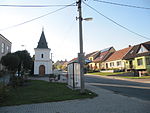The Battle of Austerlitz (2 December 1805/11 Frimaire An XIV FRC), also known as the Battle of the Three Emperors, was one of the most important and decisive military engagements of the Napoleonic Wars. The battle occurred near the town of Austerlitz in the Austrian Empire (modern-day Slavkov u Brna in the Czech Republic). Around 158,000 troops were involved, of which around 24,000 were killed or wounded. The battle is often cited by military historians as one of Napoleon's tactical masterpieces, in the same league as other historic engagements like Cannae or Gaugamela. The military victory of Napoleon's Grande Armée at Austerlitz brought the War of the Third Coalition to an end, with the Peace treaty of Pressburg signed by the French and Austrians later in the month. These achievements did not establish a lasting peace on the continent. Austerlitz had driven neither Russia nor Britain, whose armies protected Sicily from a French invasion, to settle. Meanwhile, Prussian resistance to the growing power of French military invasions in Central Europe led to the War of the Fourth Coalition in 1806.
After eliminating an Austrian army during the Ulm campaign, French forces seized Vienna in November 1805. The Austrians avoided further conflict until the arrival of the Russians, who helped increase the allied numbers. Napoleon sent his army north in pursuit of the Allies but then ordered his forces to retreat so he could feign a grave weakness to lure the Allies into thinking that they were facing a weak army, while it was in fact formidable. Napoleon gave every indication in the days preceding the engagement that the French army was in a pitiful state, even abandoning the dominant Pratzen Heights near Austerlitz. He deployed the French army below the Pratzen Heights and deliberately weakened his right flank, enticing the Allies to launch a major assault there in the hopes of rolling up the French line. A forced march from Vienna by Marshal Davout and his III Corps plugged the gap left by Napoleon just in time. Meanwhile, the heavy Allied deployment against the French right weakened the Allied center on the Pratzen Heights, which was viciously attacked by the IV Corps of Marshal Soult. With the Allied center demolished, the French swept through both enemy flanks; this sent the Allies fleeing chaotically, which enabled the French to capture thousands of prisoners.
The Allied disaster significantly shook the faith of Emperor Francis in the British-led war effort. France and Austria agreed to an armistice immediately, and the Treaty of Pressburg followed shortly after, on 26 December. Pressburg took Austria out of both the war and the Coalition while reinforcing the earlier treaties of Campo Formio and of Lunéville between the two powers. The treaty confirmed the Austrian loss of lands in Italy and Bavaria to France, and in Germany to Napoleon's German allies. It also imposed an indemnity of 40 million francs on the defeated Habsburgs and allowed the fleeing Russian troops free passage through hostile territories and back to their home soil. Critically, victory at Austerlitz permitted the creation of the Confederation of the Rhine, a collection of German states intended as a buffer zone between France and the eastern powers, Austria, Prussia and Russia. The Confederation rendered the Holy Roman Empire virtually useless, so Francis dissolved the Holy Roman Empire in 1806, but remained as emperor of Austria. These achievements, however, did not establish a lasting peace on the continent. Prussian worries about the growing French influence in Central Europe sparked the War of the Fourth Coalition in 1806.












